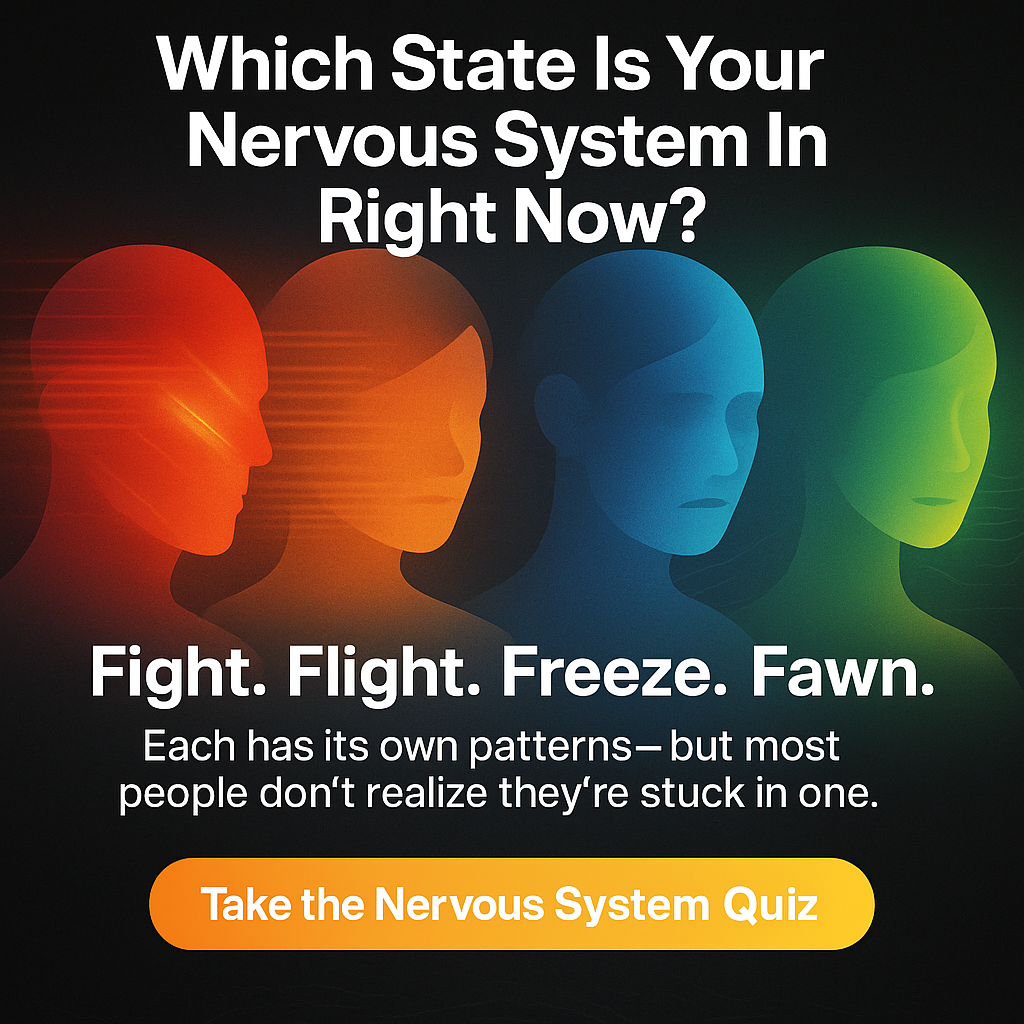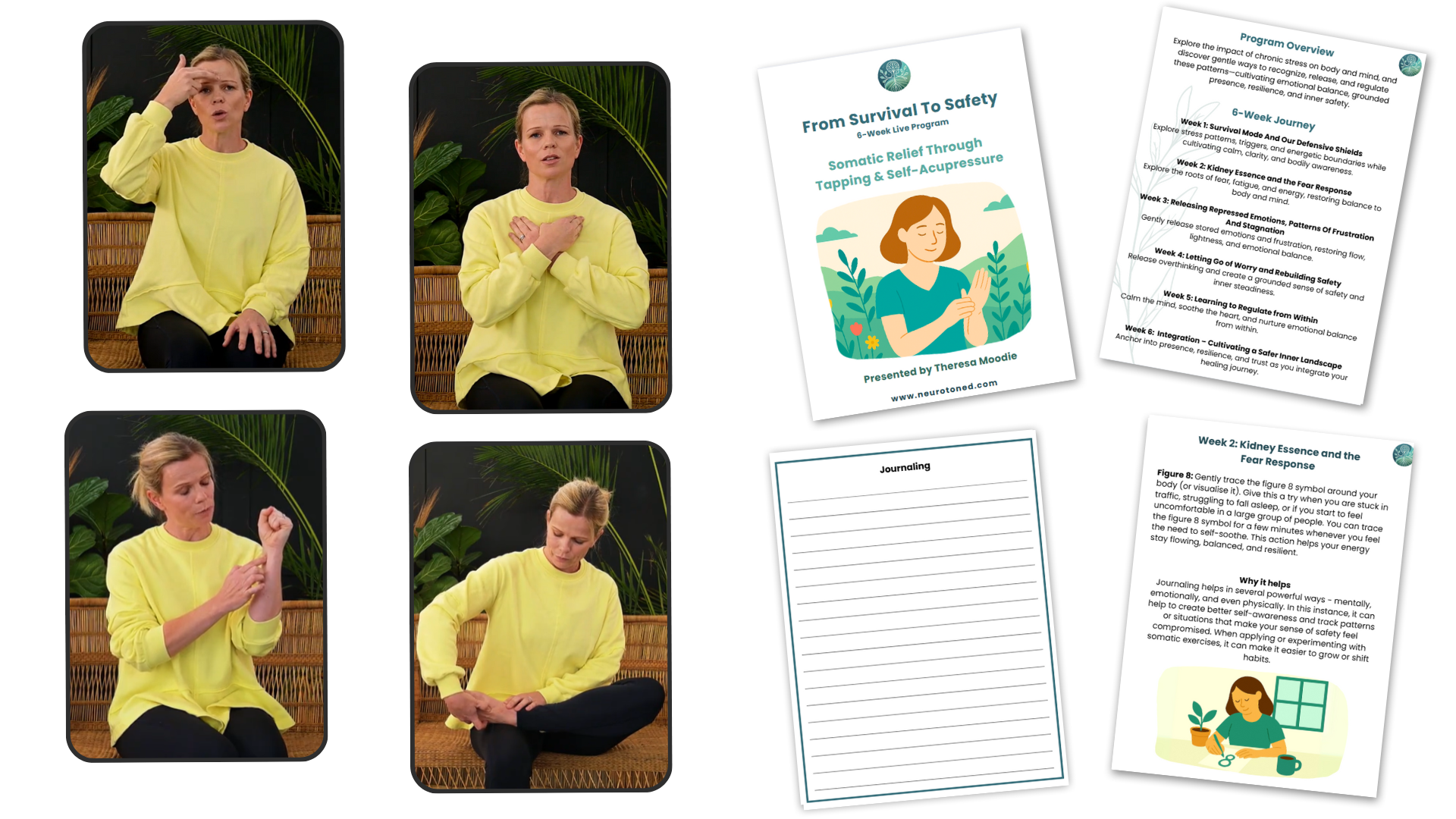
The Gut-Brain Connection and Trauma, Simply Explained
Have you ever felt your stomach twist when you’re anxious or your appetite disappear when something stressful happens? That’s your gut-brain connection in action: the conversation between your emotions and your digestion.
When you’ve lived through trauma or chronic stress, that conversation can become tense or confused. Your body might keep reacting to old stress even when life feels calm.
Understanding this loop can help you rebuild safety inside.
Take the Stress Loop Quiz to see how your nervous system may still be stuck in stress mode and learn small steps to restore balance.
What Is the Gut-Brain Connection?
Your gut and brain are in constant communication through the vagus nerve, a long nerve that runs from your brainstem to your belly. It’s part of what’s called the gut-brain axis.
When your brain senses danger, it signals your gut to pause digestion and send energy to your muscles and heart. You might feel butterflies, nausea, or a tight stomach.
When your gut is inflamed or tense, it sends alarm messages back up to your brain which can create anxiety, irritability, or fatigue. It’s a two-way street.
To learn how this system helps regulate emotions, read Vagus Nerve Breathing for Trauma Recovery: Small, Kind Steps That Actually Help.
How Trauma Affects the Gut
When you go through something frightening, your body’s survival systems take over. Digestion slows, breathing changes, and your vagus nerve shifts into high alert.
If the stress lasts too long, your gut may stay stuck in this state, constantly scanning for danger. You might notice:
- A tight belly or loss of hunger
- Bloating, constipation, or nausea during stress
- A “numb” or heavy feeling in your stomach
- Emotional ups and downs tied to digestion
This isn’t weakness or “just anxiety.” It’s your body’s protection mechanism working overtime.
If you’ve ever wondered why your stomach reacts so strongly to emotions, you might relate to Butterflies In Your Stomach: Trauma Or Anxiety?.
Reconnecting the Gut and Brain
You can gently retrain your body to feel safe again. Here are simple practices many people find helpful:
1. Start with the breath
Slow, soft exhales help calm the vagus nerve. Try breathing out longer than you breathe in.
2. Add gentle touch
Lightly massage your neck or belly. This may stimulate vagal flow and ease stomach tension.
If you want guidance, explore Vagus Nerve Massage Techniques for Beginners.
3. Ground before meals
Before eating, take a few seconds to notice your body and surroundings. Feeling present tells your brain digestion is safe.
4. Give it time
Trauma recovery is slow, and that’s okay. Each calm meal, sigh, or breath teaches your body it no longer needs to fight.
You can combine these with a 10-minute guide to nervous system reset for daily regulation.
7-Day Mini Plan for Gut-Brain Healing
Day 1-2: Do 3 slow belly breaths before each meal.
Day 3-4: Massage your belly gently at night.
Day 5: Eat one meal in silence, noticing texture and warmth.
Day 6: Take a short walk or stretch after eating.
Day 7: Reflect on one moment your body felt at ease.
Keep repeating this cycle. Small consistency rewires safety faster than big effort.
For a deeper approach to long-term healing, try this to help reset your nervous system after trauma.
Common Sticking Points
“I can’t feel my body.”
That’s okay. Many people disconnect from their body during trauma. Start small—feel your feet on the floor or your hand on your belly. Sensation returns with safety, not force.
“My stomach still acts up even when I try to relax.”
Healing takes time. The gut often holds old tension. Keep your practices gentle and consistent, and talk with a professional if pain or symptoms continue.
“I forget to breathe or eat slowly.”
You’re not failing. These habits were built in survival mode. Try pairing your new habits with cues you already do daily, like morning coffee or washing dishes.
“It feels weird to focus on my stomach.”
That’s natural. Many trauma survivors learned to tune out the gut area because it’s tied to emotion. Go slowly, and stop if it feels overwhelming.
“I get impatient.”
Healing the gut-brain connection is like teaching your body a new language of safety. Each calm breath or gentle meal is a small victory.
FAQs
Why does my stomach react so strongly to emotions?
Your vagus nerve links emotion and digestion. When you feel unsafe, your gut tightens to conserve energy.
Can calming my gut help anxiety?
Yes. Many people notice mood improvements when they support gut health and practice nervous system regulation.
What if breathing makes me more anxious?
That’s common. Try slower, smaller breaths or focus on touch instead. You can read Why Deep Breathing Makes Me More Anxious, And What To Do Instead for alternatives.
Your body and gut can learn to trust again. Start small, stay kind to yourself, and keep noticing progress.
Take the Stress Loop Quiz to learn your current pattern and begin reconnecting your nervous system and digestion.
Disclaimer: This article is educational and not medical advice. If you have health concerns, consider speaking with a qualified professional.
More Gentle Reads
- Building Resilience To Withstand The Storms of Stress
- Why Your Body Goes Numb During Stress (and Gentle Somatic Ways to Reconnect)
- How to Widen Your Window of Tolerance Daily
Discover Your Vagal Tone
Find out how dysregulated your nervous system is and get your personalized roadmap to feeling calm, energized, and in control


